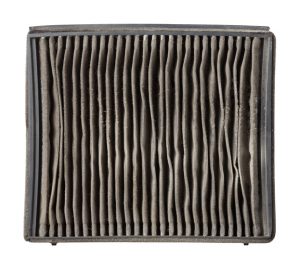What is a HEPA filter?

A dirty HEPA filter can allow mold to grow in your home.
While we all take strides to avoid outdoor air pollution and breathing in environmental irritants, we all too often forget that some of the worst environment irritants are things lurking within our homes. Indoor air pollution can irritate your throat and lungs, contribute to asthma or allergies, and bother you without any visible debris or dust in the air. While vacuuming can temporarily relieve symptoms, a more permanent and efficient air quality solution is a HEPA (high-efficiency particulate air) filter.
How do HEPA filters work?
The biggest variable in how effective a filter lies in the quality and density of the filter materials used. HEPA filters for use in vacuum cleaners have at least one outer filter to stop large particles of dirt and dust. Inside the outer filters, there is a folded paper-like mat of very dense glass fibers. The vacuum forces air through the layers of filters. As air is pushed through, the filters use three mechanisms to catch particles as they pass through and stop any mold or pollutants from escaping.
Types of HEPA Filters
The standard for HEPA qualification is a filter that can trap 99.97% of dust particles that are 0.3 microns in diameter (a micron is one millionth of a meter). How big are 0.3 microns? An average human hair is 50-150 microns in diameter, so a HEPA filter can filter out particles several hundred times smaller than that. HEPA filters are your best protection against mold spores, certain types of bacteria and viruses, and pollutants.
HEPA filters are sometimes labeled using letters to represent how well they capture particles and resist airflow. Type A are counter-intuitively the least effective HEPA filters that meet requirements. Type E HEPA filters are military-grade filters that can protect against chemical, radiological, and biological particles. HEPA filters can also be labeled type 1 (fire resistant) or type 2 (semi-combustible).
What should you know before buying a HEPA filter?
Unfortunately, HEPA filters are not all made alike. In order to ensure maximum filtration of indoor air pollutants like mold, make sure the filter you’re purchasing has genuine HEPA filtration (99.97% of particles at 0.3 microns). You can check this by checking what particulate size the manufacturer says their product has. Don’t be distracted by manufacturers that have “HEPA-type” filters without the certification and data to back it up.
HEPA filters, whether in vacuums or in air purifiers, may cost more or use more power than “HEPA-type” or non-HEPA filters. As the suction in the vacuum needs to be strong enough to pull air through all of the layers of fibers in the filter, they need stronger motors. Just like HEPA vacuum cleaners need more power to filter out mold or allergens, air purifiers with HEPA filters use more power and are more expensive to run for long periods of time. It’s also important to consider the replacement and cleaning costs for HEPA filters before you make the commitment.
Count on All Aspects Waterproofing
HEPA filters are a great choice for homeowners looking to protect their home from indoor pollutants like mold, bacteria, viruses, and allergens. For more information on how to protect your home from mold and allergens, contact All Aspects Waterproofing, a Better Business Bureau A+ rated company with over 30 years of experience in the Washington, DC./Maryland/Virginia area. Contact us online or by calling 1-866-999-3110 or 301-766-4420. To see what we’re up to, follow us on Facebook, Twitter, Google+, Pinterest, YouTube, LinkedIn, and Houzz.
